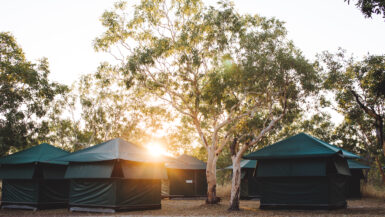Camping is a great way to connect with nature and experience the beauty of the great outdoors. However, traditional camping practices can have a negative impact on the environment, from littering to using non-renewable resources. That’s why eco-friendly camping sites in Germany are becoming increasingly popular. These campsites prioritize sustainability and environmental responsibility, while still providing a comfortable and enjoyable camping experience. In this article, we’ll explore some of the best eco-friendly camping sites in Germany, where you can enjoy the beauty of nature while also doing your part to protect it.
Introduction to eco-friendly camping in Germany
Camping is one of the most popular outdoor activities in Germany, and it’s not hard to see why. With its beautiful natural landscapes, Germany offers the perfect backdrop for a camping trip. However, traditional camping can have a negative impact on the environment. That’s where eco-friendly camping comes in. Eco-friendly camping is a sustainable way to enjoy the great outdoors while minimizing your impact on the environment. In this section, we’ll introduce you to the concept of eco-friendly camping and highlight the benefits of choosing an eco-friendly camping site for your next trip to Germany. We’ll also provide tips on how to plan an eco-friendly camping trip and discuss sustainable practices to follow while camping.
Top 5 eco-friendly camping sites in Germany
Germany has a wide range of eco-friendly camping sites, each with its own unique features and attractions. Here are the top 5 eco-friendly camping sites in Germany:
1. Campingpark Gitzenweiler Hof
Located in the beautiful Lake Constance region, Campingpark Gitzenweiler Hof is a family-owned and operated eco-friendly camping site. The site features a range of eco-friendly accommodations, including wooden cabins and treehouses, as well as traditional camping pitches. The site has a strong focus on sustainability and offers various activities, such as solar boat tours and bike rentals.
2. Naturcamping Spitzenort
Naturcamping Spitzenort is situated on the banks of the Elbe River in the picturesque town of Krautsand. The site has a range of eco-friendly accommodations, including wooden lodges and camping pitches. The site is powered by renewable energy and has an on-site farm where guests can buy fresh produce.
3. Camping Grav-Insel
Camping Grav-Insel is located on an island in the Rhine River, near the city of Wesel. The site has a range of eco-friendly accommodations, such as yurts and treehouses, as well as traditional camping pitches. The site has a strong focus on sustainability and features a range of activities, such as canoeing and cycling.
4. Campingplatz Wirthshof
Situated in the beautiful Lake Constance region, Campingplatz Wirthshof is a family-friendly eco-friendly camping site. The site features a range of eco-friendly accommodations, such as mobile homes and glamping tents, as well as traditional camping pitches. The site has a strong focus on sustainability and offers various activities, such as horse riding and hiking.
5. Campingpark Eifel
Located in the stunning Eifel National Park, Campingpark Eifel is an eco-friendly camping site that offers a range of accommodations, such as wooden cabins and camping pitches. The site has a strong focus on sustainability and features a range of activities, such as nature walks and bird watching.
These eco-friendly camping sites in Germany offer a unique and sustainable way to enjoy the great outdoors. Each site has its own features and attractions, but all share a commitment to sustainability and eco-friendliness.
Features of eco-friendly camping sites in Germany
Eco-friendly camping sites in Germany offer a range of features and amenities that set them apart from traditional camping sites. Here are some of the key features of eco-friendly camping sites in Germany:
Sustainable Accommodations
Eco-friendly camping sites in Germany offer a range of sustainable accommodations, such as wooden cabins, glamping tents, and treehouses. These accommodations are designed to minimize their impact on the environment, using materials that are renewable and eco-friendly.
Renewable Energy Sources
Many eco-friendly camping sites in Germany use renewable energy sources, such as solar power, wind power, and hydro power. This helps to reduce their carbon footprint and minimize their impact on the environment.
Waste Reduction
Eco-friendly camping sites in Germany have a strong focus on waste reduction. They encourage guests to recycle, compost, and reduce their waste. Many sites have on-site recycling facilities and composting areas.
Nature-Based Activities
Eco-friendly camping sites in Germany often offer a range of nature-based activities, such as hiking, bird watching, and wildlife spotting. These activities allow guests to connect with nature and learn more about the local environment.
Local and Organic Food
Many eco-friendly camping sites in Germany offer local and organic food options. This helps to support local farmers and reduce the carbon footprint associated with food transportation.
Environmental Education
Eco-friendly camping sites in Germany often provide environmental education programs, such as nature walks and workshops on sustainability. These programs help to raise awareness about environmental issues and encourage guests to adopt more sustainable practices in their daily lives.
These are just some of the features that make eco-friendly camping sites in Germany unique. By choosing an eco-friendly camping site, you can enjoy the beauty of the great outdoors while minimizing your impact on the environment.
Benefits of eco-friendly camping in Germany
Eco-friendly camping in Germany offers a range of benefits, both for the environment and for campers themselves. Here are some of the key benefits of eco-friendly camping in Germany:
Reduced Environmental Impact
Eco-friendly camping sites in Germany are designed to minimize their impact on the environment. By choosing an eco-friendly camping site, you can help to reduce your carbon footprint and protect the natural beauty of the area.
Closer Connection to Nature
Eco-friendly camping sites in Germany offer a closer connection to nature. By staying in sustainable accommodations and participating in nature-based activities, you can immerse yourself in the natural environment and gain a greater appreciation for the world around you.
Health Benefits
Spending time in nature has been shown to have a range of health benefits, including reduced stress, improved mood, and increased physical activity. By choosing an eco-friendly camping site in Germany, you can reap these health benefits while also minimizing your impact on the environment.
Cultural Immersion
Many eco-friendly camping sites in Germany are located in rural areas, allowing you to experience local cultures and traditions. By staying in sustainable accommodations and participating in local activities, you can gain a deeper understanding of the local community and its way of life.
Educational Opportunities
Eco-friendly camping sites in Germany often provide educational opportunities, such as nature walks and workshops on sustainability. By participating in these programs, you can learn more about the local environment and gain a greater understanding of environmental issues.
Choosing an eco-friendly camping site in Germany offers a range of benefits, both for the environment and for campers themselves. By minimizing your impact on the environment and immersing yourself in nature, you can enjoy a unique and sustainable camping experience that is both enriching and rewarding.
Tips for planning an eco-friendly camping trip in Germany
Planning an eco-friendly camping trip in Germany requires a little extra effort, but it’s worth it to minimize your impact on the environment. Here are some tips for planning an eco-friendly camping trip in Germany:
Choose an Eco-Friendly Camping Site
Start by choosing an eco-friendly camping site in Germany. Look for sites that have a strong focus on sustainability and offer eco-friendly accommodations, such as wooden cabins or glamping tents.
Minimize Your Waste
When packing for your camping trip, try to minimize your waste. Bring reusable containers, utensils, and water bottles, and avoid single-use plastics. Choose products with minimal packaging, and pack out all your trash.
Use Sustainable Transportation
Consider using sustainable transportation options to get to your camping site, such as public transportation, biking, or carpooling. This can help to reduce your carbon footprint and minimize the impact of your trip on the environment.
Choose Sustainable Activities
Choose nature-based activities that have minimal impact on the environment, such as hiking, bird watching, and wildlife spotting. Avoid activities that may disturb wildlife or damage the local ecosystem.
Respect the Environment
Respect the environment by following the Leave No Trace principles. Pack out all your trash, avoid damaging plants and wildlife, and stay on designated trails.
Support Local Businesses
Support local businesses by buying local and organic food, and participating in local activities. This can help to reduce the carbon footprint associated with food transportation and support the local economy.
By following these tips, you can plan an eco-friendly camping trip in Germany that minimizes your impact on the environment while allowing you to enjoy the beauty of the great outdoors.
Sustainable practices to follow while camping in Germany
When camping in Germany, it’s important to follow sustainable practices to minimize your impact on the environment. Here are some sustainable practices to follow while camping in Germany:
Reduce Your Energy Consumption
Reduce your energy consumption by turning off lights and electronics when not in use, and using natural light and ventilation whenever possible. Choose eco-friendly lighting options, such as solar-powered lights or LED lights.
Minimize Your Water Usage
Minimize your water usage by taking shorter showers and turning off the tap while brushing your teeth or washing dishes. Choose eco-friendly cleaning products that are safe for the environment.
Reduce Your Waste
Reduce your waste by bringing reusable containers, utensils, and water bottles, and avoiding single-use plastics. Pack out all your trash and recycle whenever possible.
Respect the Environment
Respect the environment by following the Leave No Trace principles. Stay on designated trails, avoid disturbing plants and wildlife, and pack out all your trash.
Support Local Businesses
Support local businesses by buying local and organic food, and participating in local activities. This can help to reduce the carbon footprint associated with food transportation and support the local economy.
Use Sustainable Transportation
Consider using sustainable transportation options to get around, such as biking or walking. This can help to reduce your carbon footprint and minimize the impact of your trip on the environment.
By following these sustainable practices while camping in Germany, you can minimize your impact on the environment and enjoy a more eco-friendly camping experience.
Comparison of Eco-Friendly Camping Sites in Germany with Traditional Camping Sites
When it comes to camping, traditional campsites have been the norm for many years. However, with the growing concern for the environment, more and more people are turning to eco-friendly camping sites. There are several differences between the two types of camping sites, and it’s important to understand them before deciding which one to choose.
One of the main differences between traditional and eco-friendly camping sites is the impact on the environment. Traditional camping sites often have a negative impact on the environment, with campers leaving behind trash, disturbing wildlife, and causing soil erosion. Eco-friendly camping sites, on the other hand, are designed to minimize their impact on the environment. They use sustainable practices such as composting toilets, renewable energy sources, and recycling programs to reduce waste and conserve natural resources.
Another difference is the amenities offered at the campsites. Traditional campsites often have more amenities such as swimming pools, playgrounds, and restaurants. However, these amenities require a lot of energy and water to maintain, which can have a negative impact on the environment. Eco-friendly camping sites, on the other hand, may have fewer amenities, but they are designed to be sustainable and minimize their impact on the environment.
Cost is also a factor to consider when comparing traditional and eco-friendly camping sites. Traditional campsites may be cheaper, but they often have hidden costs such as fees for electricity, water, and showers. Eco-friendly camping sites may be more expensive upfront, but they often include these amenities in the cost and have a lower impact on the environment.
In conclusion, there are several differences between traditional and eco-friendly camping sites in Germany. Eco-friendly camping sites are designed to minimize their impact on the environment, offer sustainable amenities, and may be more expensive upfront. Traditional campsites often have more amenities but can have a negative impact on the environment and may have hidden costs. Ultimately, the choice depends on the camper’s priorities and values.
Challenges Faced by Eco-Friendly Camping Sites in Germany
While eco-friendly camping sites in Germany strive to minimize their impact on the environment, they still face several challenges. These challenges can make it difficult for them to maintain their sustainability goals and attract campers.
One of the main challenges is the high cost of eco-friendly infrastructure. Building and maintaining sustainable amenities such as composting toilets, renewable energy sources, and recycling programs can be expensive. This can make it difficult for eco-friendly camping sites to offer competitive prices and attract campers who prioritize cost over sustainability.
Another challenge is the limited availability of eco-friendly resources. For example, it can be difficult to find sustainable sources of water in some areas, which can make it challenging for eco-friendly camping sites to provide showers and other amenities that require water.
Eco-friendly camping sites also face challenges in terms of waste management. While they strive to reduce waste and promote recycling, it can be difficult to ensure that campers follow sustainable practices. Campers may not understand the importance of reducing waste or may not have access to recycling facilities.
Finally, eco-friendly camping sites may face challenges in terms of regulations and permits. Building sustainable amenities may require permits and approvals from local authorities, which can be time-consuming and costly.
Despite these challenges, eco-friendly camping sites in Germany continue to strive towards sustainability. They are constantly finding innovative ways to reduce their impact on the environment and offer sustainable amenities to campers. By choosing to camp at eco-friendly sites, campers can support these efforts and help promote a more sustainable future for camping in Germany.
Future of Eco-Friendly Camping in Germany
The future of eco-friendly camping in Germany looks promising. With the growing concern for the environment, more and more people are turning to sustainable camping practices. Eco-friendly camping sites are becoming increasingly popular, and there is a growing demand for sustainable amenities and practices.
One of the main drivers of the future of eco-friendly camping is technology. As technology advances, there are more opportunities to develop sustainable amenities and practices. For example, solar panels and wind turbines can provide renewable energy sources for campsites, and new waste management technologies can help reduce waste and promote recycling.
Another driver is government regulations and incentives. Governments are increasingly recognizing the importance of sustainability and are implementing regulations and incentives to promote eco-friendly camping practices. For example, some governments offer grants and subsidies to campsites that implement sustainable practices.
The future of eco-friendly camping also depends on the actions of campers themselves. By choosing to camp at eco-friendly sites and practicing sustainable camping habits, campers can help promote a more sustainable future for camping in Germany. This includes reducing waste, conserving water, and respecting wildlife and natural habitats.
In conclusion, the future of eco-friendly camping in Germany looks promising. With advancements in technology, government regulations and incentives, and the actions of campers themselves, there is a growing movement towards sustainability in camping. By supporting eco-friendly camping sites and practicing sustainable camping habits, we can help promote a more sustainable future for camping in Germany.





Leave a reply